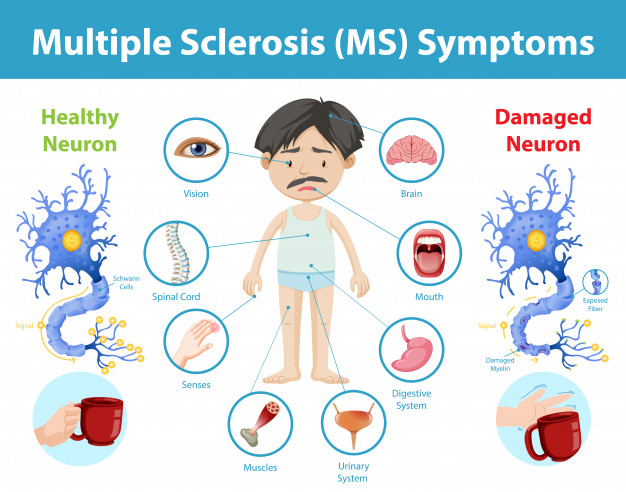Description

Copyright infringement not intended
Picture Courtesy: www.gigadocs.com
Context: A study published in Neurology suggests that depression, constipation, urinary tract infections, and sexual problems may occur several years before a diagnosis of multiple sclerosis (MS).
Details
- The study aimed to investigate whether certain symptoms and conditions are more common in individuals in the years leading up to a diagnosis of multiple sclerosis (MS).
- The researchers compared the medical records of people newly diagnosed with MS to a control group without the disease, as well as individuals with other autoimmune diseases such as Crohn's disease and lupus.
Key findings of the study
- Individuals with MS were found to be more likely to experience certain symptoms and conditions up to five years before their MS diagnosis.
- The identified symptoms and conditions included depression, constipation, urinary tract infections (UTIs), sexual problems, and bladder infections (cystitis).
- The study found that these symptoms and conditions were more likely to occur in individuals with other autoimmune diseases, such as Crohn's disease and lupus.
- The researchers observed that a higher percentage of individuals with MS had antidepressant prescriptions both five years before and after their MS diagnosis compared to those without MS.
Expert Perspectives
- Some experts express caution, noting that the identified symptoms are common and may not necessarily indicate a higher likelihood of developing MS.
- More research is needed to determine whether these symptoms are specific risk factors for MS or merely nonspecific early symptoms.
Limitations of the Study
- The study acknowledges limitations, including the lack of information on factors such as education level, ethnicity, and socioeconomic status.
- The study's database only included individuals diagnosed and seen by primary care physicians.

Multiple Sclerosis (MS)
- Multiple sclerosis (MS) is a chronic, inflammatory, and demyelinating condition of the central nervous system (CNS). The central nervous system includes the brain and spinal cord.
- In MS, the immune system mistakenly attacks the protective myelin sheath that covers nerve fibres, leading to communication problems between the brain and the rest of the body.
Key points about multiple sclerosis:
- MS symptoms vary widely and can include fatigue, difficulty walking, numbness or tingling, muscle weakness, vision problems, and problems with coordination and balance. The symptoms may come and go or progress over time.
Types of MS
- Relapsing-Remitting MS (RRMS): Characterized by periods of new symptoms (relapses) followed by periods of partial or complete recovery (remissions).
- Secondary Progressive MS (SPMS): Follows an initial period of relapsing-remitting MS, with a more steady progression of disability over time.
- Primary Progressive MS (PPMS): Characterized by a steady progression of symptoms from the onset, with no distinct relapses or remissions.
Causes
- The exact cause of MS is unknown, but it is believed to involve a combination of genetic and environmental factors. There is evidence that suggests a role for autoimmune processes, where the immune system mistakenly attacks the body's tissues.
Diagnosis
- Diagnosing MS can be challenging, as there is no single test for it. Neurologists often use a combination of clinical evaluation, medical history, imaging studies (such as MRI), and spinal fluid analysis to make a diagnosis.
Treatment
- While there is no cure for MS, there are treatments aimed at managing symptoms, slowing disease progression, and improving the overall quality of life for individuals with MS. Medications, physical therapy, and lifestyle changes are common components of MS management.
- Exercise, a healthy diet, and stress management are important for managing MS. Support groups and counselling can also be beneficial for individuals and their families in coping with the challenges of living with MS.
- Ongoing research is being conducted to better understand the underlying mechanisms of MS and to develop more effective treatments. Advances in the field include the development of disease-modifying therapies that aim to alter the course of the disease.

Conclusion
- The study suggests that certain symptoms and conditions may precede an MS diagnosis, potentially offering insights into the prodromal phase of the disease. However, experts emphasize the need for further research to validate these findings and determine their clinical significance.
Must Read Articles:
Amyotrophic lateral sclerosis: https://www.iasgyan.in/daily-current-affairs/amyotrophic-lateral-sclerosis
|
PRACTICE QUESTION
Q. Which of the following is a hallmark feature of multiple sclerosis?
A) Increased insulin production
B) Demyelination of nerve fibres
C) Elevated blood pressure
D) Excessive dopamine release
Answer: B
Explanation:
Multiple sclerosis is characterized by the immune system attacking the myelin sheath, leading to demyelination of nerve fibers, and causing communication problems between the brain and the rest of the body.
|
















